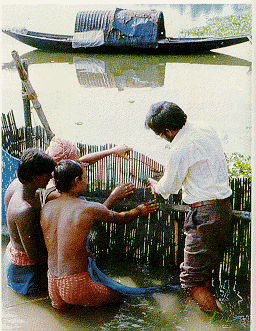
CIFT (Central Institute of Fisheries Technology)
Cochin
CIFT , named at the time of inspection as Central fisheries Technological Research Station was set up in 1954 following the recommendations of a high power committee constituted by the Ministry of Food and Agriculture , Govt. of India. It started functioning at Cochin in 1957 under the Department of Agriculture of the then Ministry of Food and Agriculture with a small nucleus of staff for research work in fishing craft and gear. The processing division of the Institute was started in 1958 and the Extension, Information and Statistics Division in 1961. The institute was given the present name in 1962. It is the only national centre in the country where research in all disciplines relating to fishing and fish processing is undertaken. Research centres function at Veraval(Gujarat), Visakhapatnam(Andhra Pradesh), Burla(Orrisa), Calicut(Kerala) and Hoshangabad(Madhya Pradesh)
The Center of Fisheries Technologies, one of the seven premier research institutes for fisheries under the Indian Council for Agricultural Research, undertakes basic and applied research to address the problems related to a wide spectrum of marine and inland fisheries activities in relation to the global scenario.
The research programmes of the
Institute aim at solving technological problems of the fisheries industry
in the country. The Institute has received financial assistance through
ad-hoc research projects sponsored by ICAR and other agencies.Funds fro
infrastructure development are also generated through revolving fund schemes
and technical consultancy programmes approved by the council.
MANDATE
The institute functions with the following mandate:
PAST ACHIEVEMENTS
The institute has all along laid stress on maximum utilization of the marine and inland resources and is striving towards self sufficiency. One important step taken in this direction has been the surveys conducted by the institute with a view to exploiting the fishery resources - both demersal and semi - pelagic on board the DOD owned research vessel Sagar Sampada. So far the entire area from the North West to the North East coast has been covered.
Ten specialised nets, to name a few demersal trawl, hybrid trawl, high opening trawl and semi pelagic trawl have been designed to replace the imported nets presently being operated from this vessel .
A large number of designs of various other types of gear like nets , purse seines, lien sand traps have also been developed for exploitation of the fishery resources. Development of a combination wire rope for deep sea fishing - an important substitution is another notable achievement.
Designs of mechanised wooden fishing vessels in the size range 7.67 - 15.25m OAL for smaller classes have been developed. The CIFT has also embarked on designing large resource vessels of 20m OAL and above in order to meet the demands of the country for exploiting the deep sea waters. Painting schedules and other cost effective methods have also been designed for the protection of the crafts. Designs of fuel efficient vessels have also been developed and commercially adopted.
The Institute has also developed a number of electronic equipments for commercial fisheries, research as well as environmental studies. Some of them are trawl depth meter, solar processing monitor, environmental data acquisition system, freezer temperature monitor, warp load meter and salinity temperature meter.
Chlorination of water is normally practised to reduce bacterial contamination for which sodium chlorite is used. CIFT has developed a Chlorine level indicator paper called Chloritest for the instant reading of Chlorine level. Other products developed for the fish processing industry are antiseptic ointment for use by prawn handlers and deodorant for masking the foul odour emanating from processing plants.
A number of packaging for various types of fish products as well as technologies for the transportation of live fish and shell fish have been developed by the Institute.
The important value added products developed by CIFT which are in demand at present within the country and abroad are fish wafers, fish soup powder, fish pickles and hygenically dried fish. shark fins and fin rays are very costly commodities, process for extraction of which has been developed by the institute
Suitable media for culture of
different types of bacteria and methods for their enumeration have been
developed. Transfer of technology through technical consultancy programmes
is a major activity of the Institute.
|
|
|
|